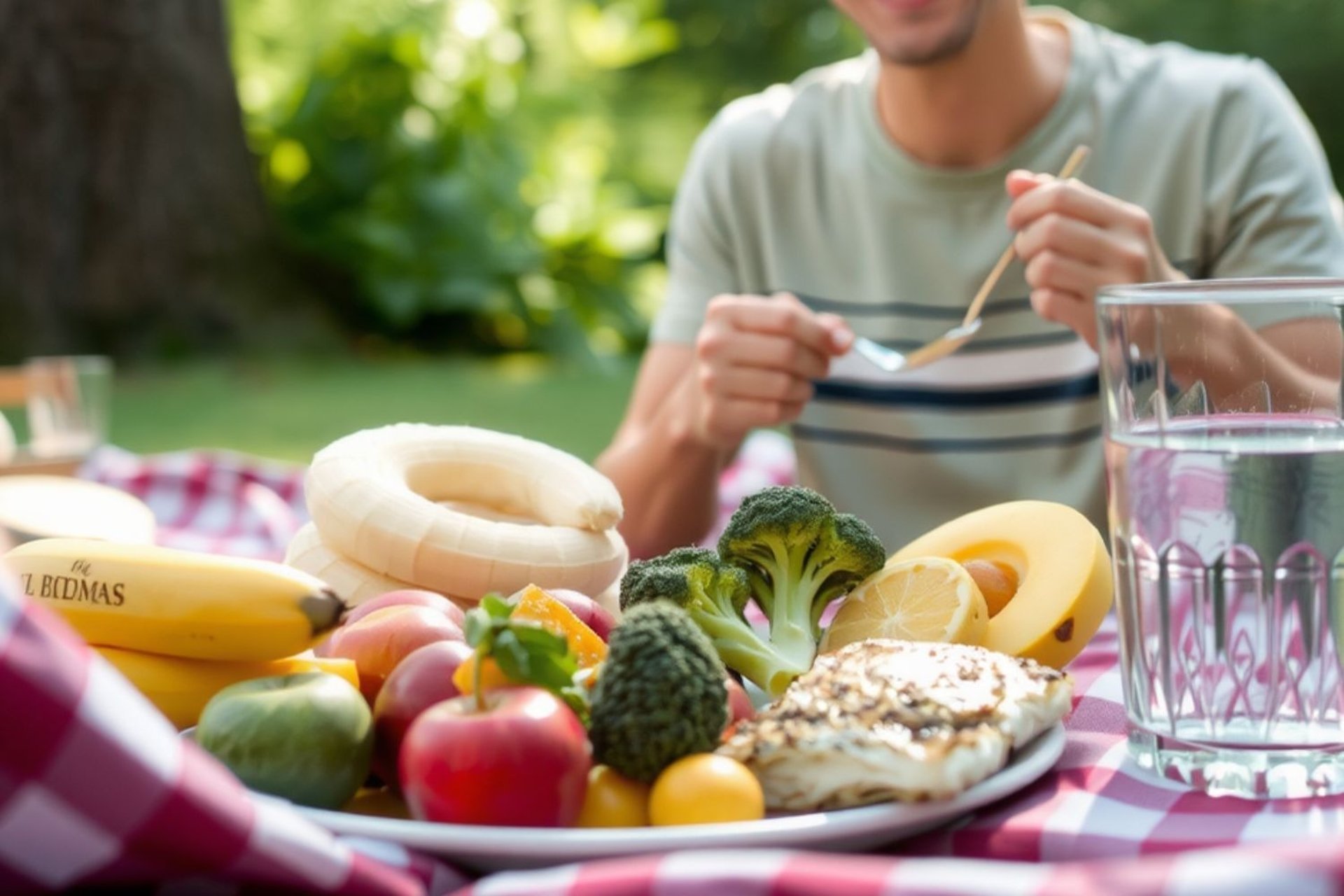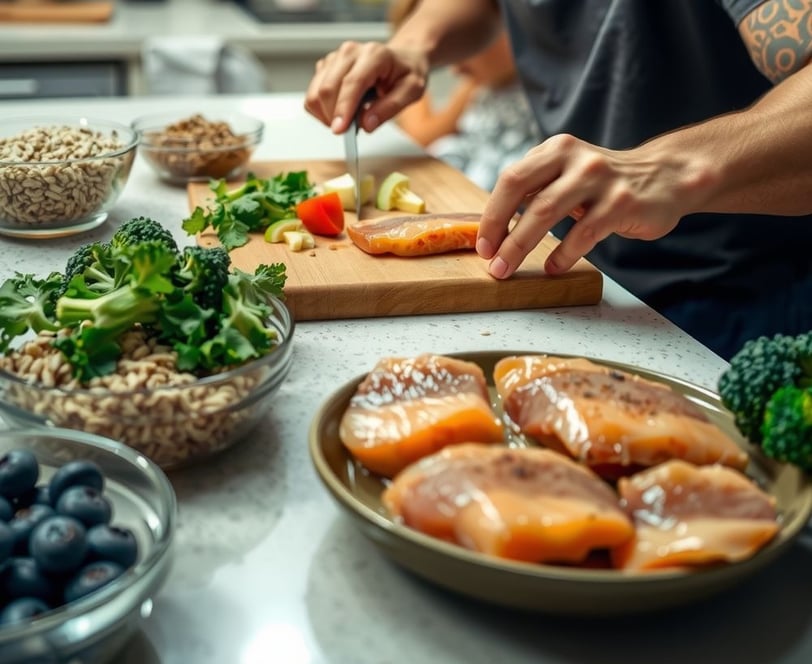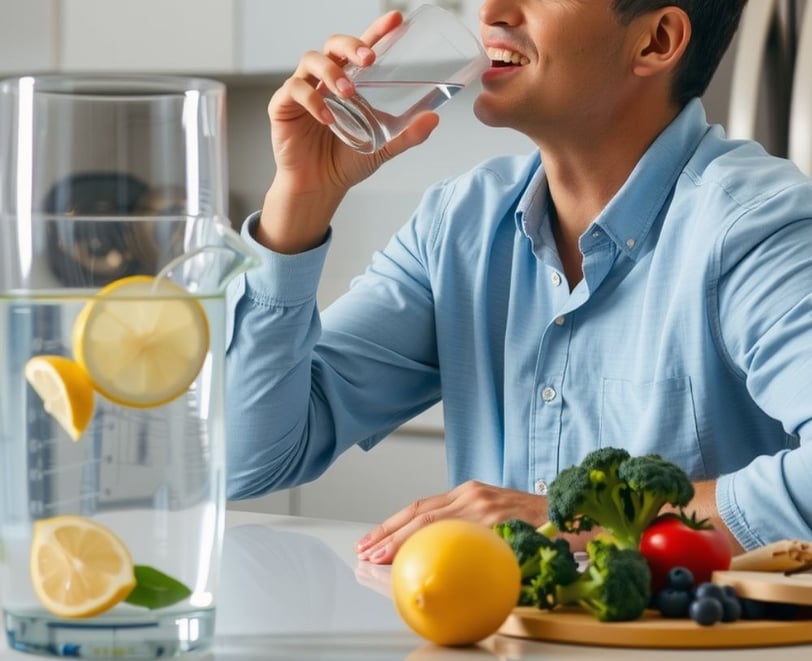
How Diet Can Impact Your Incontinence: A Guide to Bladder-Friendly Eating
Discover how your diet can impact bladder control and learn which foods to avoid for a healthier bladder! This guide offers practical tips for managing incontinence through food choices.
INCONTINENCE CARE
Introduction
Ever wonder if what you eat could be affecting your bladder health? It's true! Diet plays a surprisingly big role in managing incontinence. While there isn't a magic "cure-all" food, making smart choices about what you consume can make a world of difference in keeping those embarrassing leaks at bay. Think of it like this: your diet is like fuel for your body – including the right kind of "fuel" can help your bladder function its best!
Table of Contents


Chart showcasing bladder-friendly lean protein sources and dietary tips for supporting bladder health.
Understanding the Role of Diet in Managing Incontinence and Promoting Bladder Health
Incontinence, a condition characterized by involuntary urine leakage, affects millions worldwide. While medical treatments are available, many individuals find that dietary modifications can significantly improve their bladder control. A healthy diet plays a crucial role in overall well-being, including urological health. By understanding the link between food and incontinence, you can take proactive steps to manage your symptoms and enhance your quality of life.
The Science Behind Bladder Irritants and Their Effects on Incontinence
Certain foods and beverages act as bladder irritants, triggering contractions and increasing urine production. These irritants can worsen incontinence symptoms by irritating the bladder lining and disrupting normal urinary function. Common culprits include:
Caffeine: Found in coffee, tea, and some sodas, caffeine is a diuretic that stimulates urine production.
Alcohol: Alcohol relaxes the bladder muscles, making it harder to control urination.
Citrus Fruits: The acidity of citrus fruits can irritate the bladder lining.
Spicy Foods: Capsaicin, the compound responsible for the heat in spicy foods, can trigger bladder irritation and urgency.
Carbonated Beverages: The gas in carbonated drinks can increase pressure on the bladder.
Foods That Trigger Incontinence: Identifying Your Triggers
The relationship between diet and urinary incontinence is highly individual. What triggers one person's symptoms may not affect another. Keeping a food diary can help you identify your personal bladder irritants.
Here are some common foods that can exacerbate incontinence symptoms:
Processed Foods: High in sodium and additives, processed foods can contribute to inflammation and worsen bladder irritation.
Sugary Drinks: Sugary beverages can increase urine production and irritate the bladder lining.
Artificial Sweeteners: Some artificial sweeteners may have a diuretic effect and trigger bladder issues.
Nutritional Strategies for a Healthy Bladder Diet
While avoiding bladder irritants is important, focusing on nutrient-rich foods can support overall bladder health.
Hydration: Staying adequately hydrated is crucial for flushing out toxins and supporting healthy urine flow. Aim to drink plenty of water throughout the day.
Fiber Intake: A high-fiber diet promotes regular bowel movements, reducing pressure on the bladder. Include fruits, vegetables, whole grains, and legumes in your meals.
Anti-Inflammatory Foods: Incorporate anti-inflammatory foods like berries, leafy greens, fatty fish, and turmeric to reduce inflammation in the urinary tract.


Visual guide highlighting the role of proper hydration in maintaining bladder health and preventing urinary issues.
Bladder-Friendly Fruits and Vegetables for Incontinence
Certain fruits and vegetables are known to be gentle on the bladder:
Bananas: Rich in potassium, bananas can help regulate fluid balance.
Apples: A good source of fiber, apples promote regularity and reduce pressure on the bladder.
Blueberries: Packed with antioxidants, blueberries may help protect against urinary tract infections (UTIs).
Broccoli: This cruciferous vegetable is rich in vitamins and minerals that support overall health, including bladder function.
Lean Protein Sources and Incontinence
Protein plays a vital role in maintaining muscle mass, including the pelvic floor muscles that support bladder control. Choose lean protein sources like:
Fish: Salmon, tuna, and sardines are excellent sources of omega-3 fatty acids, which have anti-inflammatory properties.
Chicken Breast: A lean and versatile protein source.
Beans and Lentils: These plant-based proteins are high in fiber and can help regulate bowel movements.
Healthy Fats and Incontinence: What You Need to Know
Healthy fats are essential for overall health, including bladder function. Include these sources in your diet:
Avocado: Rich in monounsaturated fats, avocados promote healthy cholesterol levels and reduce inflammation.
Olive Oil: A good source of antioxidants and anti-inflammatory compounds.
Nuts and Seeds: Almonds, walnuts, chia seeds, and flaxseeds are packed with healthy fats and fiber.
( Please note that individual dietary needs can vary, and it's always best to consult with a healthcare professional for personalized advice. The above list is a general guideline for foods that may affect bladder health. )
Portion Control and Bladder Health: Eating for Optimal Function
Overeating can put pressure on the bladder and worsen incontinence symptoms. Practice mindful eating by paying attention to your body's hunger cues and stopping when you feel satisfied.
Timing Your Fluids: A Smart Approach to Hydration and Incontinence
While staying hydrated is important, timing your fluid intake can help manage incontinence. Avoid drinking large amounts of fluids before bedtime or engaging in activities that increase bladder pressure.
Dietary Tips for Better Incontinence Control at Home
Keep a Food Diary: Track your food intake and any changes in your symptoms to identify potential triggers.
Eat Regular Meals: Skipping meals can lead to fluctuations in blood sugar levels, which may worsen incontinence.
Limit Caffeine and Alcohol: Reduce your consumption of these bladder irritants.
Choose Bladder-Friendly Foods: Focus on fruits, vegetables, lean proteins, and whole grains.
Overactive Bladder Diet: A Comprehensive Guide
For individuals with an overactive bladder (OAB), specific dietary modifications can be particularly helpful.
Foods to Include: Fruits, vegetables, whole grains, lean protein, low-fat dairy products, and water.
Foods to Avoid: Caffeine, alcohol, spicy foods, citrus fruits, carbonated beverages, and processed foods.
Lifestyle Considerations Beyond Diet for Incontinence Management
While diet plays a crucial role, other lifestyle factors can also impact bladder health:
Pelvic Floor Exercises: Strengthening the pelvic floor muscles can improve bladder control.
Weight Management: Maintaining a healthy weight reduces pressure on the bladder.
Stress Management: Stress can worsen incontinence symptoms. Practice relaxation techniques like yoga or meditation.
Understanding and Preventing Urinary Tract Infections (UTIs)
UTIs can contribute to incontinence by causing inflammation and irritation in the urinary tract.
Dietary Strategies to Prevent UTIs: Drink plenty of water, consume cranberry juice or supplements, and avoid sugary drinks.
Consult a Healthcare Professional: If you experience symptoms of a UTI, seek medical attention promptly.
Infographic explaining urinary tract infections (UTIs), including causes, symptoms, and prevention tips for better bladder health.


The Role of Probiotics in Maintaining Bladder Health
Probiotics are beneficial bacteria that can support gut health and potentially improve bladder function.
Foods Rich in Probiotics: Yogurt, kefir, sauerkraut, kimchi, and kombucha.
Consult a Healthcare Professional: Discuss the potential benefits of probiotic supplements with your doctor.
The Importance of Kidney Health in Managing Incontinence
Kidney health is closely linked to bladder function. Maintaining healthy kidneys can help prevent or manage incontinence.
Dietary Considerations for Supporting Kidney Health: Limit sodium intake, reduce processed food consumption, and stay hydrated.
Integrative Approaches: Combining Diet with Other Treatments
Diet can complement medical treatments for incontinence. Work with your healthcare team to develop a comprehensive management plan that includes both dietary modifications and other therapies.
Crafting a Personalized Incontinence Diet Plan
Managing incontinence through diet requires a personalized approach. By understanding the link between food and bladder health, identifying your triggers, and adopting a healthy eating pattern, you can take control of your symptoms and improve your quality of life. Remember to consult with healthcare professionals for guidance and support.
Additional Resources
For more insights on managing incontinence while traveling, these helpful resources dive deeper into how diet affects bladder health. From foods that might aggravate symptoms to dietary strategies that can support bladder function, these articles offer practical tips to help you stay in control:
Healthline - Overactive Bladder Diet: What to Eat and What to Avoid: This article discusses how diet can impact overactive bladder (OAB) symptoms. It highlights foods and drinks that may aggravate OAB, such as carbonated beverages, caffeine, alcohol, and spicy or acidic foods. It also suggests dietary changes that may help reduce symptoms, like increasing fiber intake and staying hydrated.
Robotic Cancer Surgery - A Urologist’s Top Nutrition Tips for Bladder Health: This blog post by Dr. S. Adam Ramin provides nutrition tips for maintaining bladder health. It explains how certain foods can irritate the bladder lining and cause symptoms like urinary frequency and urgency.
WebMD - Urinary Incontinence in Women: Diet Triggers: This article discusses how certain dietary changes can help manage urinary incontinence and overactive bladder (OAB). It highlights six key adjustments: monitoring water intake, reducing alcohol and caffeine, avoiding spicy and acidic foods, and cutting out carbonated drinks1.
National Association For Continence (NAFC) - Why Your Diet Matters When You Have Incontinence: This blog post explains how diet impacts bladder health, especially for those with incontinence or OAB. It lists common bladder irritants like carbonated beverages, caffeine, alcohol, and acidic or spicy foods.
Frequently Asked Questions
Q. What foods should I avoid if I have incontinence?
Common bladder irritants include caffeine, alcohol, citrus fruits, spicy foods, carbonated beverages, and processed foods.
Q. Can diet help manage bladder control issues?
Yes, dietary modifications can significantly improve bladder control by reducing inflammation, managing fluid intake, and supporting overall urinary health.
Q. Are there specific foods that promote bladder health?
Fruits, vegetables, lean proteins, whole grains, and water are all beneficial for bladder health.
Q. Final Thoughts on Living Well with Incontinence
Living with incontinence can be challenging, but remember that you're not alone. By adopting a healthy lifestyle, including dietary changes, pelvic floor exercises, and stress management techniques, you can take control of your symptoms and live a fulfilling life.
Q. How to Stay Informed About Bladder Health and Incontinence
Stay up-to-date on the latest research and recommendations in urology and geriatric care by:
Consulting with Healthcare Professionals: Regularly discuss your bladder health with your doctor or a continence specialist.
Reading Reputable Sources: Seek information from trusted organizations like the National Institutes of Health (NIH) and the American Urological Association (AUA).
Empower Your Bladder Health Through Smart Food Choices
Remember, taking control of your bladder health starts with making informed food choices! By understanding which foods might be working against you and embracing those that support your bladder's well-being, you can feel more confident and empowered. Have you discovered any dietary tips that have helped manage your incontinence? Share them with us in the comments below – let's learn from each other! And don't forget to share this post with anyone who might find it helpful.
Related Article
More for you



